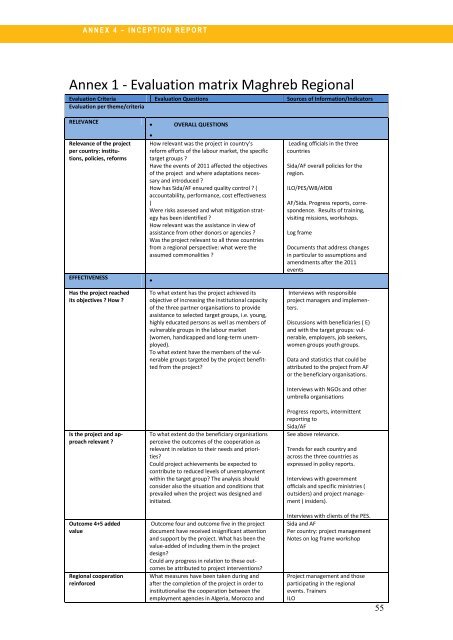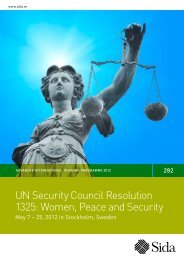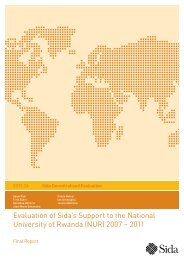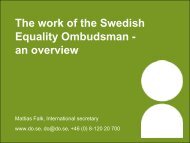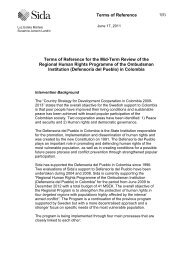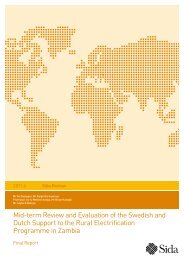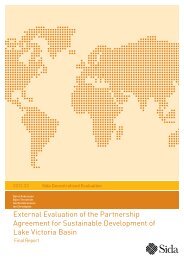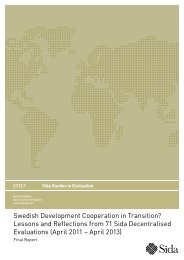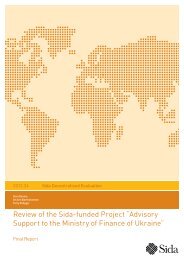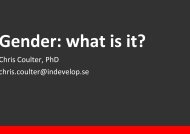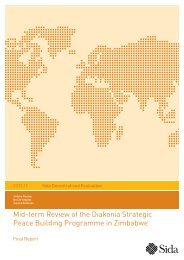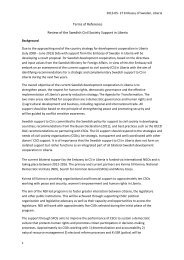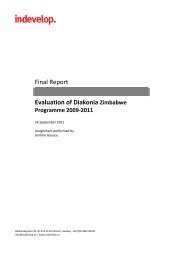Evaluation of the Maghreb Regional Training Programme - Indevelop
Evaluation of the Maghreb Regional Training Programme - Indevelop
Evaluation of the Maghreb Regional Training Programme - Indevelop
Create successful ePaper yourself
Turn your PDF publications into a flip-book with our unique Google optimized e-Paper software.
e<br />
A N N E X 4 – I N C E P T I O N R E P O R T<br />
Annex 1 - <strong>Evaluation</strong> matrix <strong>Maghreb</strong> <strong>Regional</strong><br />
<strong>Evaluation</strong> Criteria <strong>Evaluation</strong> Questions Sources <strong>of</strong> Information/Indicators<br />
<strong>Evaluation</strong> per <strong>the</strong>me/criteria<br />
RELEVANCE<br />
Relevance <strong>of</strong> <strong>the</strong> project<br />
per country: institutions,<br />
policies, reforms<br />
EFFECTIVENESS<br />
Has <strong>the</strong> project reached<br />
its objectives ? How ?<br />
Is <strong>the</strong> project and approach<br />
relevant ?<br />
Outcome 4+5 added<br />
value<br />
<strong>Regional</strong> cooperation<br />
reinforced<br />
<br />
OVERALL QUESTIONS<br />
<br />
How relevant was <strong>the</strong> project in country’s<br />
reform efforts <strong>of</strong> <strong>the</strong> labour market, <strong>the</strong> specific<br />
target groups ?<br />
Have <strong>the</strong> events <strong>of</strong> 2011 affected <strong>the</strong> objectives<br />
<strong>of</strong> <strong>the</strong> project and where adaptations necessary<br />
and introduced ?<br />
How has Sida/AF ensured quality control ? (<br />
accountability, performance, cost effectiveness<br />
)<br />
Were risks assessed and what mitigation strategy<br />
has been identified ?<br />
How relevant was <strong>the</strong> assistance in view <strong>of</strong><br />
assistance from o<strong>the</strong>r donors or agencies ?<br />
Was <strong>the</strong> project relevant to all three countries<br />
from a regional perspective: what were <strong>the</strong><br />
assumed commonalities ?<br />
<br />
To what extent has <strong>the</strong> project achieved its<br />
objective <strong>of</strong> increasing <strong>the</strong> institutional capacity<br />
<strong>of</strong> <strong>the</strong> three partner organisations to provide<br />
assistance to selected target groups, i.e. young,<br />
highly educated persons as well as members <strong>of</strong><br />
vulnerable groups in <strong>the</strong> labour market<br />
(women, handicapped and long-term unemployed).<br />
To what extent have <strong>the</strong> members <strong>of</strong> <strong>the</strong> vulnerable<br />
groups targeted by <strong>the</strong> project benefitted<br />
from <strong>the</strong> project?<br />
To what extent do <strong>the</strong> beneficiary organisations<br />
perceive <strong>the</strong> outcomes <strong>of</strong> <strong>the</strong> cooperation as<br />
relevant in relation to <strong>the</strong>ir needs and priorities?<br />
Could project achievements be expected to<br />
contribute to reduced levels <strong>of</strong> unemployment<br />
within <strong>the</strong> target group? The analysis should<br />
consider also <strong>the</strong> situation and conditions that<br />
prevailed when <strong>the</strong> project was designed and<br />
initiated.<br />
Outcome four and outcome five in <strong>the</strong> project<br />
document have received insignificant attention<br />
and support by <strong>the</strong> project. What has been <strong>the</strong><br />
value-added <strong>of</strong> including <strong>the</strong>m in <strong>the</strong> project<br />
design?<br />
Could any progress in relation to <strong>the</strong>se outcomes<br />
be attributed to project interventions?<br />
What measures have been taken during and<br />
after <strong>the</strong> completion <strong>of</strong> <strong>the</strong> project in order to<br />
institutionalise <strong>the</strong> cooperation between <strong>the</strong><br />
employment agencies in Algeria, Morocco and<br />
Leading <strong>of</strong>ficials in <strong>the</strong> three<br />
countries<br />
Sida/AF overall policies for <strong>the</strong><br />
region.<br />
ILO/PES/WB/AfDB<br />
AF/Sida. Progress reports, correspondence.<br />
Results <strong>of</strong> training,<br />
visiting missions, workshops.<br />
Log frame<br />
Documents that address changes<br />
in particular to assumptions and<br />
amendments after <strong>the</strong> 2011<br />
events<br />
Interviews with responsible<br />
project managers and implementers.<br />
Discussions with beneficiaries ( E)<br />
and with <strong>the</strong> target groups: vulnerable,<br />
employers, job seekers,<br />
women groups youth groups.<br />
Data and statistics that could be<br />
attributed to <strong>the</strong> project from AF<br />
or <strong>the</strong> beneficiary organisations.<br />
Interviews with NGOs and o<strong>the</strong>r<br />
umbrella organisations<br />
Progress reports, intermittent<br />
reporting to<br />
Sida/AF<br />
See above relevance.<br />
Trends for each country and<br />
across <strong>the</strong> three countries as<br />
expressed in policy reports.<br />
Interviews with government<br />
<strong>of</strong>ficials and specific ministries (<br />
outsiders) and project management<br />
( insiders).<br />
Interviews with clients <strong>of</strong> <strong>the</strong> PES.<br />
Sida and AF<br />
Per country: project management<br />
Notes on log frame workshop<br />
Project management and those<br />
participating in <strong>the</strong> regional<br />
events. Trainers<br />
ILO<br />
55


